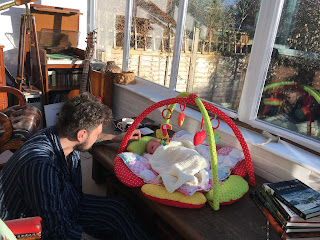A Helping Hand
“Does your partner help with the baby?”
“My husband never helps with the housework.”
“The other-half helps out with night-feeds and changes.”
“Daddy helps on weekends.”
“My husband never helps with the housework.”
“The other-half helps out with night-feeds and changes.”
“Daddy helps on weekends.”
Common conversational turns of phrase, there. But they drive me up the wall – you see, T doesn’t *help* me with Spud, or help me with the housework, or help out with changes, feeding, or leisure activities.
T does these things because, well, Spud is his baby, and this is his home too. He’s not *helping* – he’s playing with the baby, he does the housework, he spends time with the child that he co-created.
Across my social media are swathes of primary caregivers (usually women) complaining that their partners (usually men) do not ‘help’ with the baby, or the housework; that they spend more time with friends than in the family home, and that, when they are present, they prefer to watch television, play computer games, or otherwise check-out, rather than "help" with the dishes, the baby, or the other children.
Aside from the fact that I find this sort of behaviour appalling anyway (these are, presumably, grown-ass men – they shouldn’t need to be asked, or told, to perform basic functions of housekeeping and child-rearing), I can’t help but feel as though the problem is compounded by the suggestion that undertaking these tasks is somehow magnanimous, or above-and-beyond what is expected of a normal, fully-functioning adult who lives in a house and has had a hand in bringing another human being into that house.
Suggesting that T helps me with the housework, or with Spud, is disrespectful to both parties in the relationship: it implies that these areas are my responsibility, and that I need assistance with fulfilling my role. It also suggests the T is a subordinate in the caregiving and cleaning department, and can’t be relied upon to take responsibility for his own child-rearing or general cleanliness.
When T gets home from work, he doesn’t ask “What can I help with?” He asks “What can I do?” or, in a revolutionary turn, does the washing up, or the recycling; or takes Spud to be changed, bathed, or fed; or whatever, without either needing to ask, or be told, or make out as though I *should* have done these things.
I get that this is just a linguistic tweak and that it may not even register in the grand scheme of issues. But words, and how we use them, are important. In a survey of societal attitudes it was found that a large percentage of the population believed that women with young children should either NOT work, or only work part-time in order to take care of the house and the children. It was, not surprisingly, not reflected in attitudes towards men, work, and raising children. This sexist viewpoint is pervasive in our culture and means that the bulk of expectation regarding housework either falls upon, or is expected to be picked up by, the woman in a partnership. And the problem is compounded by a whole host of child-bearing, rearing, and caring issues, which is a blog for another time...
It is just a quirk of language, but language is, obviously, how we communicate. And what we communicate to our children about care, responsibility, and equality, are important. And that’s why T doesn’t help me with the housework…





Comments
Post a Comment